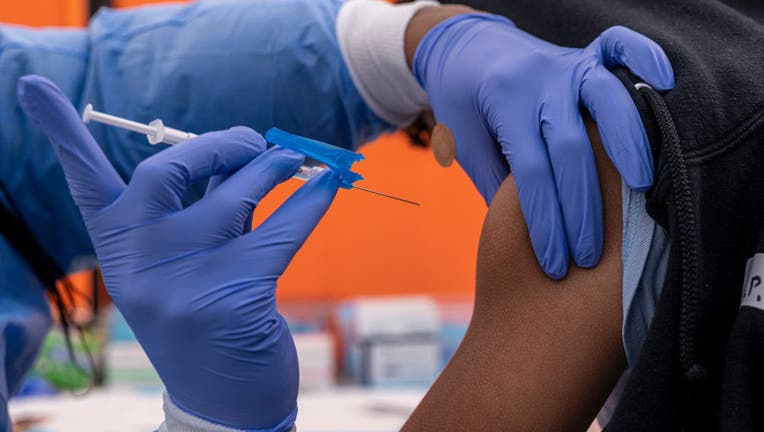FDA approves Pfizer COVID-19 booster for children ages 5 to 11

FILE IMAGE - A healthcare worker administers a Pfizer-BioNTech COVID-19 vaccine to a child at a testing and vaccination site in San Francisco, California, on Jan. 10, 2022. Photographer: David Paul Morris/Bloomberg via Getty Images
U.S. regulators approved Pfizer-BioNTech's COVID-19 booster shot for healthy American children ages 5 through 11.
The U.S. Food and Drug Administration announced the expanded approval on Tuesday. Pfizer’s booster shot is recommended at least five months after the initial two-dose series of the vaccine in an effort to enhance protection as infections once again creep upward.
The recommendation for this age group still needs a final sign-off by the U.S. Centers for Disease Control and Prevention. The agency’s scientific advisers are scheduled to meet on Thursday.
"While it has largely been the case that COVID-19 tends to be less severe in children than adults, the omicron wave has seen more kids getting sick with the disease and being hospitalized, and children may also experience longer term effects, even following initially mild disease," FDA Commissioner Robert Califf, M.D., said in a statement.
Pfizer’s shot is the only COVID-19 vaccine available for children of any age in the U.S. Those ages 5 to 11 receive one-third of the dose given to everyone 12 and older.
In April, Pfizer announced that it had submitted an application to the FDA to expand its booster shot to healthy elementary-age kids. Everyone 12 and older is already urged to get a booster dose for the best protection against emerging new variants — and some people, including those 50 and older, can choose a second booster.
RELATED: Why are vaccines still important if so many kids have already had COVID-19?
Whether elementary-age children need a booster has been overshadowed by parents’ outcry to vaccinate even younger tots, those under 5 — the only group not yet eligible in the U.S. Both Pfizer and rival Moderna have been studying their shots in the youngest children, and the FDA is expected to evaluate data from one or both companies sometime next month.
For the 5- to 11-year-olds, it's not clear how much demand there will be for boosters. Only about 30% of that age group have had the initial two Pfizer doses since vaccinations opened to them in November.
But in a small study, Pfizer found a booster revved up those kids’ levels of virus-fighting antibodies — including those able to fight omicron — the same kind of jump adults get from an extra shot.
While the coronavirus is more dangerous to adults than to children, youngsters can get severely ill — and more than 350 children ages 5 to 11 have died, according to CDC’s count.
Adding to public confusion, the CDC estimates that 3 out of every 4 U.S. children of all ages have been infected with the coronavirus since the pandemic’s start — many of them during the winter omicron wave. Still, health authorities urge vaccination even in people who’ve previously had COVID-19, to strengthen their protection.
Vaccination may not always prevent milder infections, especially as omicron and other strains are better than some prior variants at slipping past those defenses. But health authorities agree that vaccinations continue to offer strong protection against the worst outcomes of COVID-19, including hospitalization and death.
"As we all know and have heard before, the COVID vaccine was developed to reduce severe infection and reduce hospitalization and death — and it is still doing that," Melissa Marx, an assistant professor and epidemiologist at the Johns Hopkins Bloomberg School of Public Health, told FOX Television Stations last month.
"Vaccines have absolutely changed childhood survival in this country and around the world, and the COVID vaccine is no exception. There is, in my mind, no reason not to get a potentially life-saving, preventative vaccine," Marx added.
This story was reported from Cincinnati. The Associated Press contributed.

